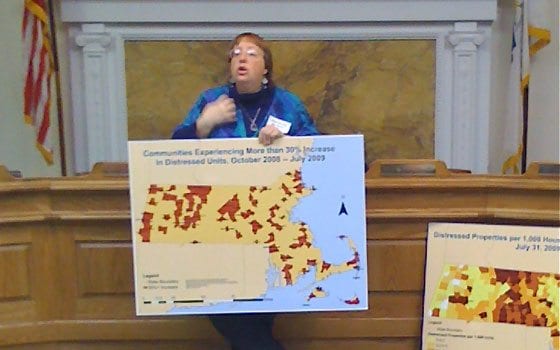
Housing advocates and residents facing foreclosure gathered at the State House last Thursday to voice support for several bills aimed at slowing the foreclosure rate and making the process more equitable for homeowners and tenants.
The hearing before the Joint Committee on the Judiciary drew an overflow crowd of legislators, homeowners, tenants, community organizers, legal aid and real estate attorneys, small property owners and lending industry representatives.
“Under current state law, tenants can be evicted without just cause—leaving our most vulnerable residents on perilous ground,” said Sen. Harriette Chandler (D-Worcester), one of the main sponsors of Senate and House legislation that would protect tenants in foreclosed properties from eviction without cause.
“You have to do something to help the tenants in foreclosed properties,” pleaded Gladys Vega, a community activist from Chelsea who blamed part of the problem on “predators.”
“I was proud that we were staying stable. Things were better for tenants,” she said. “But it has gone downhill because tenants have to leave the properties.”
Other foreclosure-related bills up for discussion included an act to establish a foreclosure mediation process, whereby homeowners could demand a face-to-face meeting with their lenders; a six-month moratorium on foreclosures to allow time for loan modification negotiations; and a judicial foreclosure act requiring court approval for foreclosures.
Speakers supporting the judicial foreclosure bill cited the recent ruling by Justice Keith C. Long of Massachusetts Land Court that invalidated two Springfield foreclosures because ownership of the mortgages was not clear at the time of the foreclosures. The decision may put hundreds of sales of foreclosed properties in jeopardy.
“If we had a judicial foreclosure law, as do 25 other states, these [problems] would not have been an issue,” said Nadine Cohen, an attorney with Greater Boston Legal Services. She testified along with Eugene Berman, chair of the Hampden County Bar Association Foreclosure Prevention Task Force, and Suffolk Law School professor Kathleen C. Engel. “We need judicial foreclosure to protect owners and anyone buying property,” Cohen said.
A Chelsea family was a case in point. Through an interpreter, they told of purchasing a foreclosed property recently, only to find out — after moving in — that it had been sold to another bank at the same time. On top of the trauma of losing the house, they are worried they have lost the $3,000 they paid the realtor.
Evelyn Friedman, director of the City of Boston’s Department of Neighborhood Development, spoke in favor of House Bill 3522 that was promulgated by Mayor Thomas Menino and sponsored by Rep. Liz Malia (D-Jamaica Plain). The bill covers tenant protection and mediation, and allows cities to institute an abandoned properties registry, as Boston already has, requiring contact information for an owner or manager to be posted in all foreclosed and vacant buildings. Boston’s program has been successful in forcing owners — mainly lenders — to maintain properties, Friedman said.
Opponents of some of the bills said increased paperwork and administrative costs for lenders could make it more difficult or expensive for new homebuyers to get loans.
Mary Ann Clancy testified on behalf of the Massachusetts Credit Union League in opposition to judicial foreclosure. She said the added regulation and cost of a judicial review requirement would hurt credit unions, which were not at fault for the foreclosure escalation.
She also noted there are now about 30 foreclosure-related bills in six different legislative committees, and urged the Judiciary Committee to “take a leadership role” to prevent a “patchwork response” to a serious issue.
Just before the hearing, the Mass Alliance Against Predatory Lending (MAAPL), a statewide coalition of community and legal services agencies, hosted a “speakout” at the State House to draw attention to the human toll of foreclosure.
Evicted tenants and homeowners struggling to stay in their homes expressed their pain at the speakout and asked for help.
“The bank took the house and they only gave us one month to leave,” said a tenant in a foreclosed building in Chelsea, “We don’t have any place to go.”
Marie Degand told of her fight to keep her home in Medford. She said she paid $3,300 a month for the first two years and then found out her monthly payments were going up to $4,500. She fell behind and has been unable to renegotiate her loan.
“I have seven kids, five grandkids. I work two jobs,” she said, fighting tears, “I work too much — and now it’s for nothing.”
Speakout organizers stressed the need for the legislature to move the bills quickly toward resolution.
“Behind every legislative bill is a human story, someone who’s being hurt,” said Grace Ross, a coordinator with MAAPL.
“The problem is multiplying because the legislature hasn’t put a stop to anything,” Ross said. “If they had acted earlier — some of these bills were filed a year and a half ago — you would really see a difference by now.”
Judiciary Committee members had few questions during Thursday’s testimony. Their next step is to scrutinize the bills and the testimony, said a Committee spokesperson. There was no word on when any of the foreclosure bills might move to the Senate or House floor for a vote.






